7 Reasons Why Your Legs Feel Heavy When Running
Reviewed by: Ernesto Mendez (Orthopedic Clinical Specialist)
Discover the mystery behind why your legs feel heavy when running – it’s your body’s way of signaling something unusual. This article will delve into the common causes of heavy legs when running and provide effective solutions to enhance your performance and eliminate discomfort.
So, instead of disregarding the message, let’s explore how you can tackle this concern head-on. Read on to find all the answers you need!
why do legs feel heavy while running?
There are many reasons why legs feel heavy when running, including a lack of sleep, hydration, and essential nutrients such as carbs and iron. Additionally, overtraining, excessive weight training, poor posture while running, and wearing inadequate shoes can contribute to this issue.
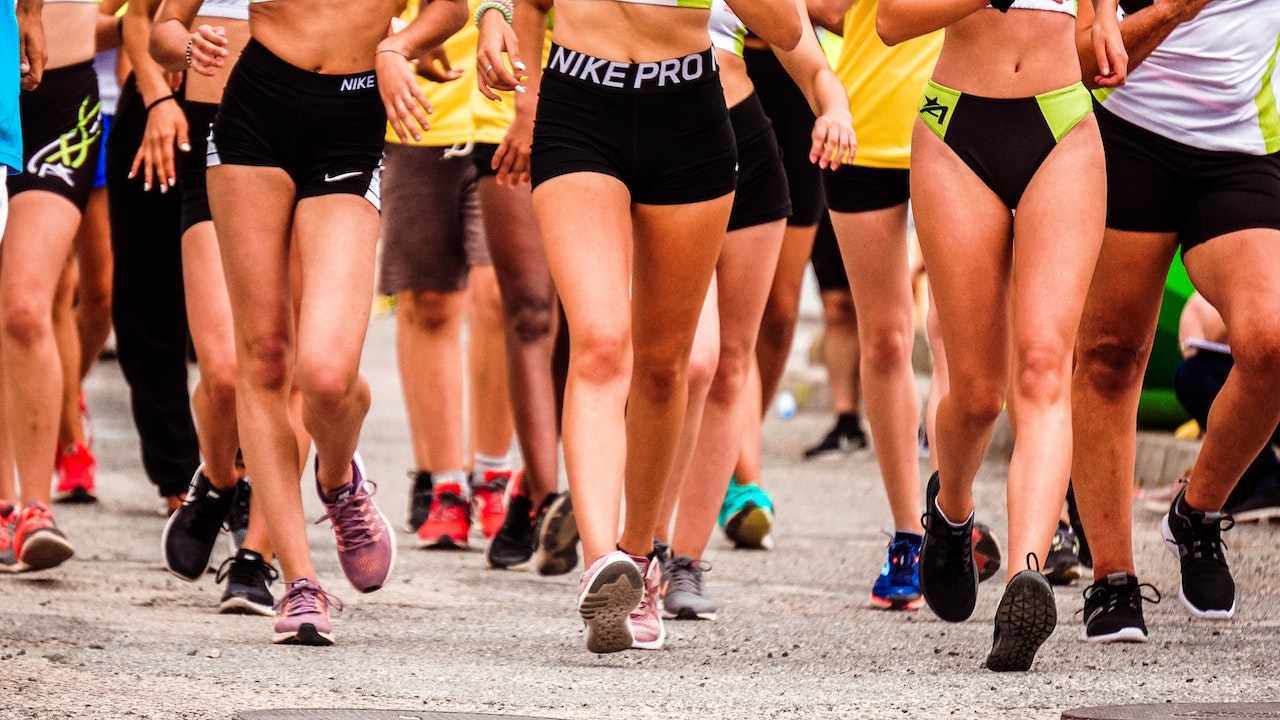
Heavy Legs When Running: Is It Normal?
Heavy legs are a common sensation all runners experience from time to time. However, ignoring this issue is not advisable, as it can significantly impact your performance.
It’s important to understand that this feeling can be a signal that your body needs something. Since many factors impact the feeling of heavy legs, sometimes the reason is simple, like you didn’t get enough (or enough quality) sleep.
However, heavy legs can also be related to poor circulation, known as venous insufficiency. If that is the cause and it is left untreated, it can lead to more serious problems, such as varicose veins.
Varicose veins are a prevalent condition characterized by bulging, twisted veins in the legs and feet. It’s more common in women, and the risk of varicose veins increases as we age, especially for people who spend most of their day sitting or standing, overweight people, and people with a family history of this condition.
Heavy legs can significantly impact your performance, running efficiency, and overall enjoyment of the activity. So, you need to understand the symptoms, what causes them, and how to fix the issue.
9 Symptoms of Heaviness In the Legs During or After Running
The terms “heavy” and “tired” legs are commonly used, but it’s essential to understand their implications. If you experience such sensations, you may wonder if they qualify as leg heaviness.
Let’s explore nine symptoms associated with this condition.
1. Fatigue
Fatigue is a condition of both physical and mental tiredness. Typically, it is characterized by a strong sense of exhaustion and low energy.
Runners can experience fatigue both during and after running. During a run, muscles may become fatigued because of the accumulation of metabolic byproducts and the depletion of energy stores. This often leads to a sense of heaviness and weakness and difficulty sustaining performance.
After running, the body might still experience fatigue as it tries to recuperate and heal. Factors such as dehydration, inadequate nutrient intake, and insufficient sleep can exacerbate fatigue.
2. Stiffness
“Why do my legs stiffen up when I run? Is that usual?”
Stiffness is a feeling of reduced flexibility and ease of movement in the muscles and joints. It often occurs due to the buildup of lactic acid and other waste products, as well as micro-tears in muscle fibers, during running.
After a run, the stiffness can become more pronounced as the body cools down and the muscles contract. However, the discomfort is temporary, and the muscles will recover and relax.
3. Sluggishness
Sluggishness refers to a feeling of reduced speed, energy, and responsiveness during runs. It often manifests as a sense of the body moving slower or struggling to maintain the desired pace.
There are many factors causing sluggishness, including dehydration, electrolyte imbalances, poor nutrition, running in hot and humid conditions, a lack of proper warm-up, and stress.
4. Aching
Aching in the muscles is a common sensation of discomfort or soreness. It typically arises from tiny micro-tears in the muscle fibers that occur during running and various other forms of physical activity.
This aching impression, often referred to as delayed onset muscle soreness (DOMS), is a natural part of the muscle recovery process, typically peaking within 24 to 72 hours after exercise.
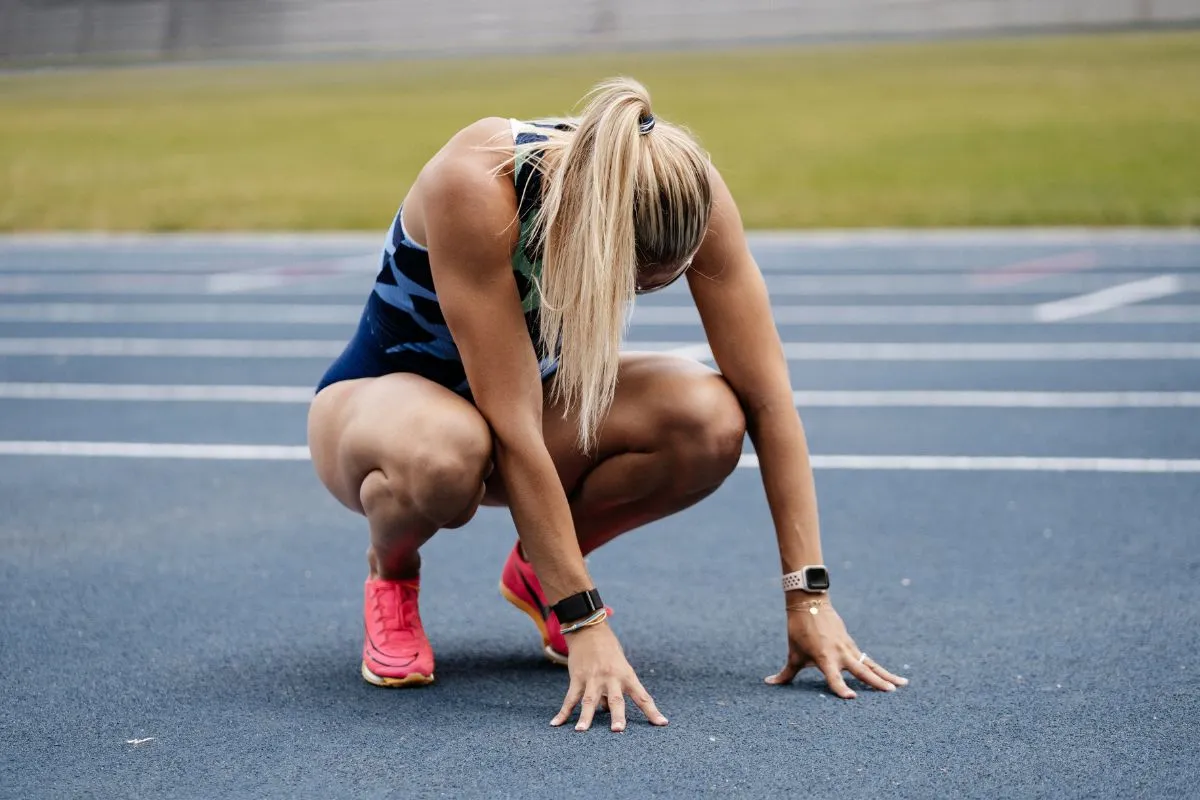
5. Weakness
Weakness is another common symptom that you might experience. It is the result of muscle fatigue and the depletion of energy stores. In such cases, you may notice that your one leg feels weak when running, or both of them.
After the run, your body may continue to feel weak as it works to recover and replenish its energy reserves. This feeling can persist until adequate rest and proper nutrition allow the muscles to fully recover their strength.
6. Numbness or Tingling
Usually, nerve compression or decreased blood flow to the extremities, such as the feet or hands, is what causes numbness and tingling.
This type of feeling can result from improperly fitting footwear or incorrect running form, leading to prolonged pressure on nerves or blood vessels To relieve numbness and tingling, it’s important to address the underlying issue, wear suitable gear, and adjust your running technique.
7. Swelling
Swelling, during or after running, typically occurs in the lower extremities, such as the ankles and feet. It frequently develops out of increased fluid retention in the tissues, also known as edema, which can result from running’s repetitive impact.
If you experience swelling during or after running, it could imply that there’s a problem with fluid regulation, insufficient recovery, or underlying health conditions.
8. Muscle Cramps
Muscle cramps are sudden, involuntary contractions of muscles that can cause intense pain and disruption. They often occur due to muscle fatigue, dehydration, electrolyte imbalances, or inadequate warm-up and stretching before running.
These cramps happen because of the loss of vital minerals such as potassium, calcium, and sodium through sweating.
9. Reduced Endurance
Reduced endurance decreases a runner’s ability to sustain physical activity for a prolonged period. This decrease can manifest as a feeling of breathlessness, leading to a decreased capacity to maintain the desired pace or distance.
Reduced endurance may result from various factors, such as inadequate training, overtraining, improper nutrition, a lack of rest and recovery, and underlying health issues. All these factors have one thing in common—they impact the body’s ability to efficiently use oxygen and energy during running.
7 Causes Why Your Legs May Feel Heavy When Running
We’ve prepared a list of the seven most common reasons why you might experience heavy legs when running, including the following:
1. Overtraining
Pushing your limits and working toward set goals is an amazing attribute, but it also has limitations. Pushing yourself too hard can have negative consequences in the long run.
Overtraining is a common reason why runners feel heavy legs while running.
Are you familiar with the feeling known as “running legs tired but not out of breath”? If you feel like your legs giving out while running, but you can still run further, overtraining is likely the reason why.
Moreover, overtraining can occur because your joints and bones strengthen slower than your cardiovascular fitness improves. This is particularly true for beginner runners or those just starting their running journey.
Even if your cardio endurance allows you to run long distances, like 10k, it’s essential to do so regularly only if your leg muscles have sufficient time to strengthen and adapt.
Also, minor running injuries are also considered a result of overtraining. If you’re overtraining, you might notice your legs becoming stiff during runs as they are still healing.
It’s crucial not to overlook any signs of strains, sprains, or leg fractures. Instead, give your body the rest it needs to recover..
2. Sleep Deprivation
We often hear about the importance of sleep, but do you know what actually happens to our bodies when we sleep?
Lack of sleep impairs these processes, leading to inadequate muscle recovery. Consequently, running with fatigued muscles, they are more likely to feel heavy and sluggish.
Moreover, sleep is also crucial for restoring energy in the body. Without enough sleep, the body’s glycogen (energy) reserves may not be fully replenished. So, runners heavy leg syndrome occurs due to reduced energy availability caused by sleep deprivation.
But that is not all. Sleep deprivation can lead to reduced blood flow and poor circulation. This can cause muscles to receive less oxygen and nutrients during a run, leading to heaviness and discomfort.
Furthermore, sleep deprivation can disrupt the body’s hormonal balance, including hormones responsible for regulating muscle growth and repair. This imbalance can negatively impact the recovery process, leading to the feeling of heavy legs while running.
And still, there is more to the list. Sleep deprivation can cause many other symptoms that lead to the feeling of tired legs running, but these are the most common ones.
Subscribe to Our Running Newsletter!
Get free running tips from renowned professional athletes and discounts from top-notch brands.
3. Dehydration
Dehydration can cause heavy legs while running due to insufficient fluid levels in the body. When you are dehydrated, the reduced blood volume leads to decreased circulation and oxygen supply to the muscles. As a result, the muscles may fatigue more quickly, leading to a feeling of heaviness and sluggishness during running.
On top of that, dehydration can affect the balance of electrolytes in the body, such as sodium, potassium, and calcium, which are essential for proper muscle function. This imbalance can lead to muscle cramps and discomfort, further contributing to the feeling of heavy legs.
To prevent dehydration-related issues, it is crucial to stay adequately hydrated before, during, and after your runs, especially in hot and humid conditions.

4. Poor Running Form
Improper running form can lead to a feeling of heavy legs while running because it puts excessive pressure on the muscles and joints. Inefficient running mechanics, like overstriding, hunching the shoulders, or not engaging the core properly, can lead to a misalignment of the body.
Also, it can further increase the workload on certain muscle groups. Moreover, poor form can negatively impact the energy transfer during each stride, making the running motion less fluid and efficient.
To achieve better running performance, prevent injuries, and overcome heavy legs, focus on improving your running form. Receive proper coaching, practice relevant technique drills regularly, and remain mindful of your running form.
5. Excessive Weight Training
You might experience tired legs during runs because you overdo your weight training.
Excessive weight training can cause heavy legs while running, as it may lead to muscle fatigue and reduced mobility. Engaging in intense weightlifting routines without adequate recovery can result in overworked leg muscles, making them feel tired and heavy during running sessions.
On top of that, if the focus of weight training is solely on building muscle mass without incorporating flexibility and mobility exercises, the increased muscle bulk can restrict natural running movements. This can often lead to a sensation of heaviness and stiffness.
If this is something you recognize yourself in, try balancing weight training with appropriate rest. Additionally, improve your stretching routine and incorporate mobility exercises. This can help you prevent heavy legs and ensure a more harmonious integration of strength training and running performance.

6. Food or Fuel Deficiencies
Another common reason why your legs feel heavy when running is a lack of carbs and iron.
- Carbs are necessary because they are the primary energy source during exercise, especially during endurance activities like running. When you consume carbohydrates, your body breaks them down into glucose, which fuels your muscles during running.
Lack of carbs can lead to tired and heavy legs because your muscles have insufficient energy to perform optimally. Without enough carbs, the body may rely on other energy sources like stored fat or protein, but these are less efficient. - Iron plays a crucial role in oxygen transport throughout the body. Hemoglobin, a protein in red blood cells, contains iron and carries oxygen from the lungs to the muscles during exercise.
Adequate iron levels are essential for optimal oxygen delivery to the working muscles, especially during running when the muscles require increased oxygen for energy production.
When the body lacks sufficient iron, hemoglobin and red blood cell production are compromised, resulting in reduced oxygen-carrying capacity. Due to this, your muscles may not receive enough oxygen during running, leading to early running leg fatigue, weakness, and a perception of heaviness in the legs.
7. Wrong Shoes
Wearing the wrong shoes can cause heavy legs because they lack necessary support, cushioning, and shock absorption.
Inadequate support can strain the muscles and ligaments in the legs due to improper foot movement.
What’s more, insufficient cushioning and shock absorption can increase the impact on the legs with each stride, leading to muscle fatigue and a sensation of heaviness during running.
If this is the reason for your discomfort, choose appropriate running shoes that match your foot type and running style. This helps in preventing injuries and promoting an enjoyable and efficient running experience.
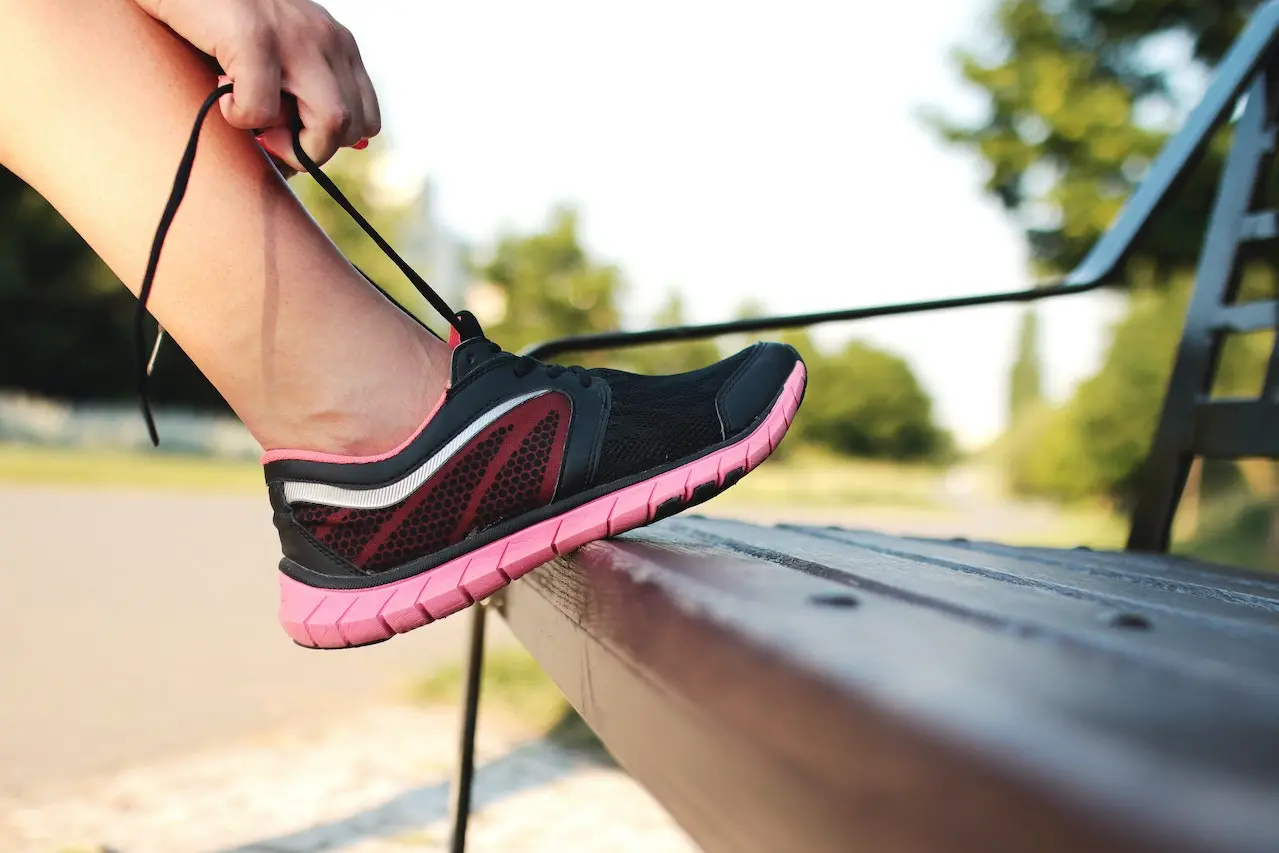
5 Pro Tips How to Treat Heaviness In the Legs After Running
After completing the run session, you may experience the effects of running dead legs, making it challenging to take another step. Try these five pro tips to relieve that feeling.
1. Cool Down and Stretch
Perform a proper cool-down routine after your run, including light jogging or walking, to gradually lower your heart rate. Stretching the major leg muscles, like the hamstrings, quadriceps, and calves, helps release built-up tension and improve flexibility. Improving blood circulation to the muscles through these practices can provide benefits such as delivering necessary oxygen and nutrients for a quicker recovery and relief of leg heaviness.
2. Rest and Recovery
Allow your body enough time to rest and recover after a run. Avoid excessive or intense physical activities until the heaviness subsides. The rest allows the muscles to recover and regain their strength, alleviating the heaviness sensation. On top of that, it helps reduce inflammation and swelling in the legs, improves blood flow, and promotes the removal of metabolic waste.
3. Massage the Legs Regularly
Massage can be a valuable post-run recovery technique for reducing the heaviness in the legs. With regular massages, you can stimulate blood circulation and lymphatic drainage. It will help to alleviate swelling and congestion in the legs.
By relaxing tight muscles, promoting the removal of metabolic waste, and triggering the release of endorphins, massage contributes to a sense of lightness and overall well-being.
4. Foam Rolling
As a runner, you may find relief in foam rolling. This simple practice can help reduce leg heaviness by relaxing tight muscles, improving blood circulation, and breaking down adhesions. As part of your post-run recovery routine, foam rolling can enhance overall muscle relaxation. Give it a try and see how it benefits your body!
5. Check In With Your Doctor
If heaviness in the legs persists and does not improve despite trying self-care measures and allowing for adequate rest and recovery, it’s essential to go and see a doctor. A healthcare professional can conduct a thorough evaluation, perform necessary tests or imaging, and provide a proper diagnosis and treatment plan tailored to your situation.
5 Tips to Prevent Heavy Legs While Running
Prevention is better than cure. Here are proven and effective methods you can try.
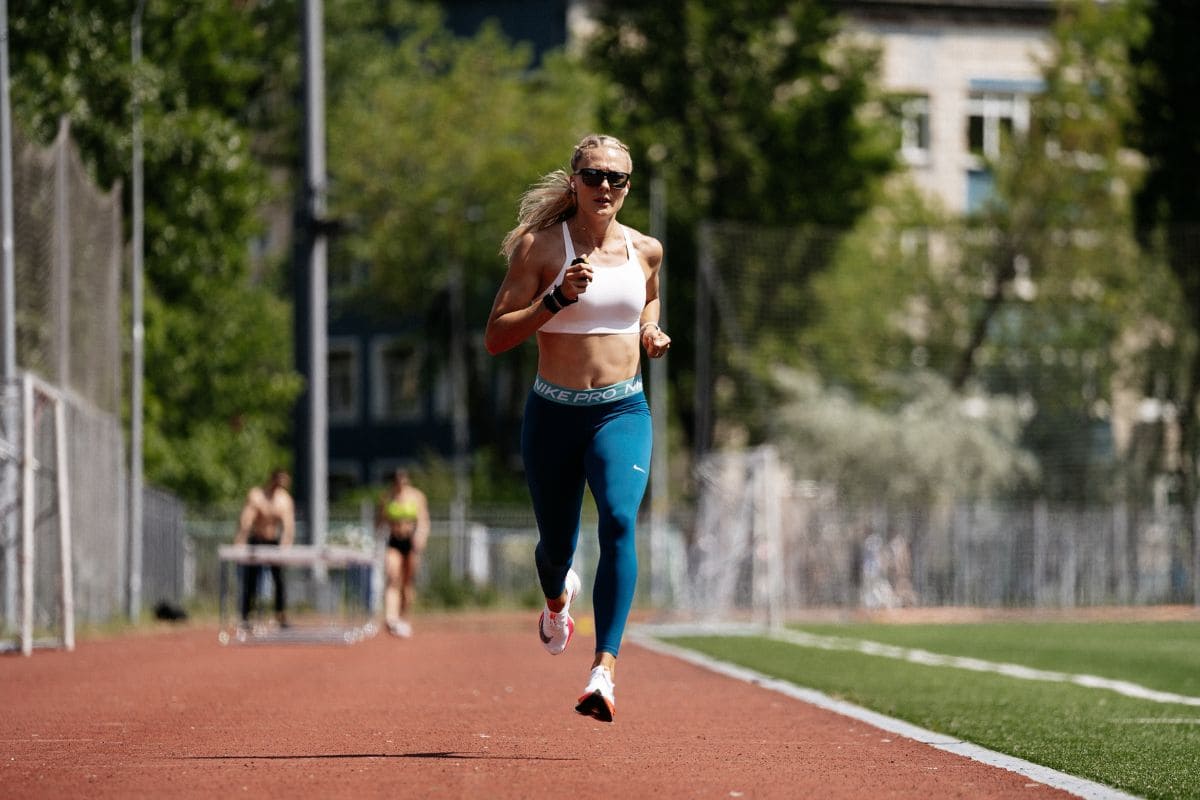
1. Do the Proper Warm-up
Always start your runs with a dynamic warm-up to increase blood flow to the muscles and prepare them for the activity ahead.
2. Wear the Right Footwear
Wear appropriate running shoes that provide proper support and cushioning and fit well for your foot type and running style.
3. Hydrate
Stay well-hydrated before, during, and after your runs to maintain optimal blood circulation and prevent dehydration-related heaviness.
4. Adjust Your Route And Stride
If you’re feeling heavy in your legs while running, making changes to your route and stride can be helpful. Choosing to run on softer surfaces, such as grass or trails, can lessen the impact on your muscles and joints.
5. Watch Your Nutrient Intake
Maintaining a well-balanced diet that includes sufficient carbohydrates, proteins, and essential nutrients is important to support healthy energy levels and muscle function.
Good sources of carbs are whole grains (for example, brown rice, quinoa, and oats), starchy vegetables (like sweet potatoes and butternut squash), legumes (beans, lentils), and fruits (such as bananas, apples, and berries).
To increase your protein intake, eat more foods like chicken, turkey, fish, tofu, tempeh, beans, lentils, and low-fat dairy products.
Frequently asked questions about why Legs Feel Heavy When Running
Does dehydration cause heavy legs during a run?
When you’re dehydrated, your body lacks sufficient fluids to maintain normal blood volume and circulation. Because of this, the blood thickens, causing the heart to struggle to efficiently pump oxygen and nutrients to the muscles.
How to keep running when your legs are tired?
We know you are a high achiever who wants to thrive. However, you need to be careful while pushing yourself and practice listening to your body. If your legs are too tired, try slowing down and shortening your stride. On top of that, take walk breaks and hydrate. And if you still don’t feel your best, end your run, recover, and then try again.
Embrace the Challenge of Tired Legs
To sum up, runners might feel heavy legs due to muscle fatigue, dehydration, insufficient warm-up, and incorrect running technique. To alleviate this sensation, post-run practices such as cooling down, stretching, and foam rolling can help muscles recover and relax.
It is also helpful to modify running routes, surfaces, and strides to reduce the impact on muscles and avoid heavy legs. By prioritizing proper rest, hydration, and recovery techniques, you can improve your performance and enjoyment while decreasing the sensation of heaviness in the legs.
Don’t underestimate the message your body is sending you—it works in your favor.
Feel free to ask any questions you might have in the comment section!
And if you want to share your favorite ways to fix heaviness in the legs, we would love to know!
Also read:
- 22 Minute 5K Pace
- Why Are Runners So Skinny
- Running Shorts With Underwear
- Creatine for Running
- Best Running Shoes for Heel Strikers
- Best Running Visors
- Best Massage Gun for Runners
- Neutral vs Stability Running Shoes
References:
- Varicose Veins // NHLBI: https://www.nhlbi.nih.gov/health/varicose-veins#
- Sleep is the foundation for healthy habits // Mayo Clinic Health System: https://www.mayoclinichealthsystem.org/hometown-health/speaking-of-health/sleep-is-the-foundation-for-healthy-habits
- Carbohydrates1 // PMC: https://www.ncbi.nlm.nih.gov/pmc/articles/PMC4224210/
- Iron // NCBI: https://www.ncbi.nlm.nih.gov/books/NBK222309/
If you have any questions or suggestions, you can contact us via email – [email protected]

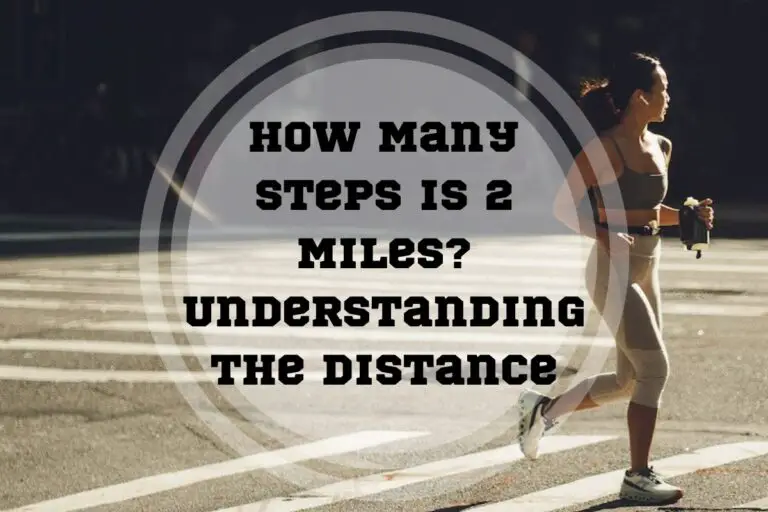





Здесь доступна информация по запросу, от кратких контактов до подробные профили.
Базы данных охватывают граждан любой возрастной категории, мест проживания.
Сведения формируются по официальным записям, что гарантирует достоверность.
Поиск осуществляется по имени, сделав работу удобным.
глаз бога программа для поиска
Также можно получить адреса плюс актуальные данные.
Все запросы проводятся в соответствии с норм права, предотвращая несанкционированного доступа.
Обратитесь к предложенной системе, в целях получения необходимую информацию без лишних усилий.